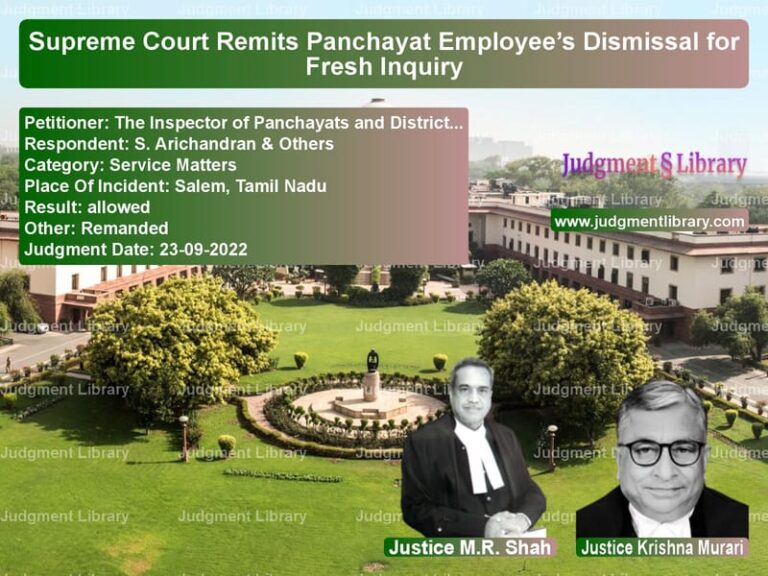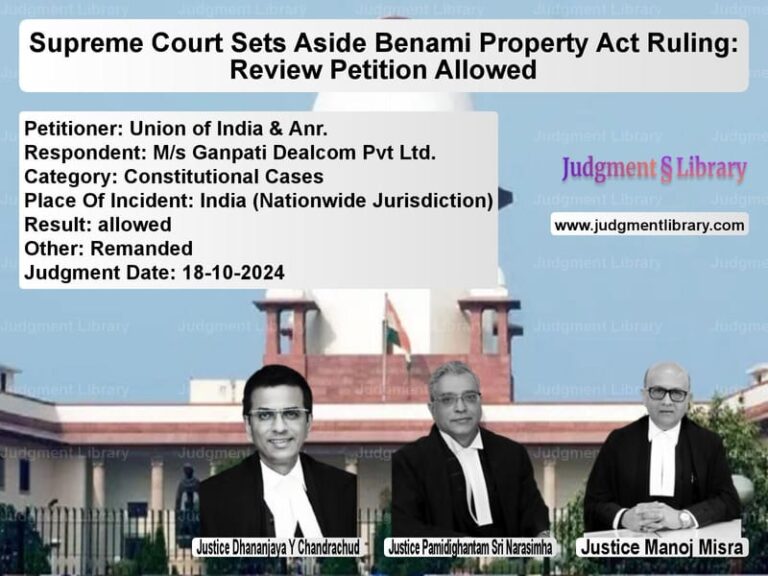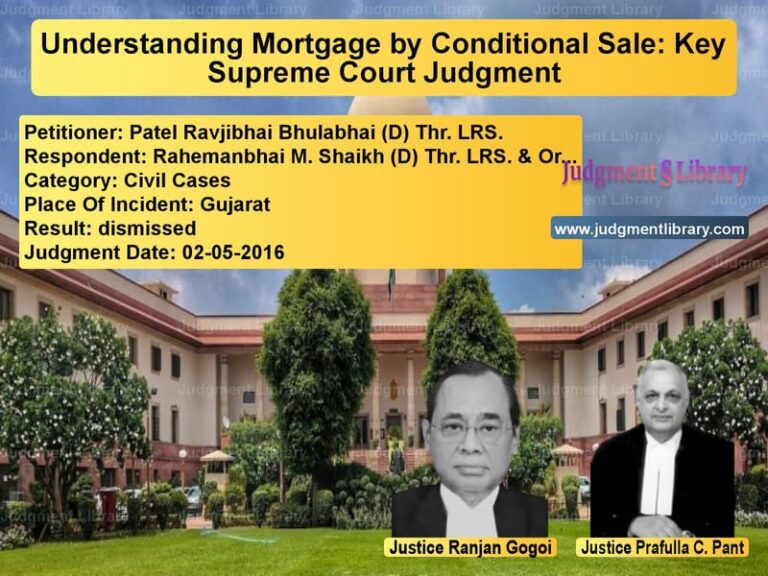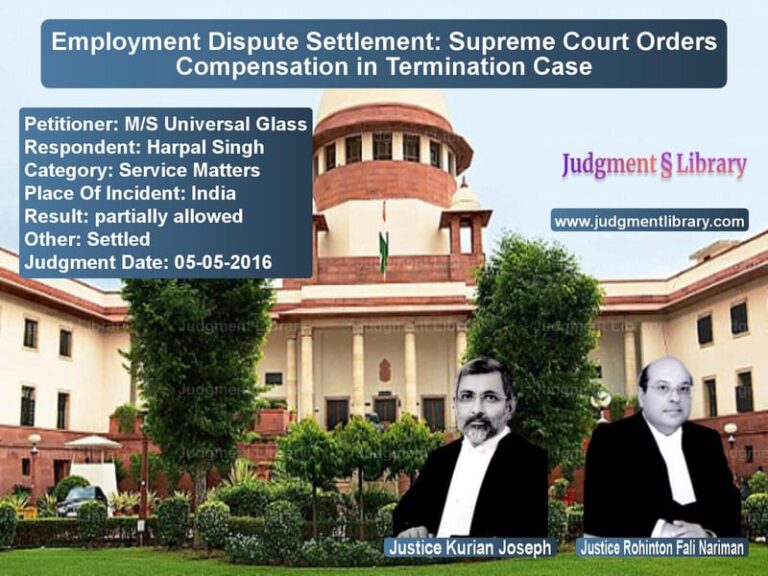Supreme Court Upholds Conviction in FCI Fertilizer Scam: Shiv Shankar Prasad Singh vs. State of Bihar
The Supreme Court of India, in Shiv Shankar Prasad Singh vs. State of Bihar, upheld the conviction of two officials of the Food Corporation of India (FCI) in a large-scale fertilizer misappropriation case. The Court dismissed the appeals of the accused, confirming their conviction for criminal conspiracy, misappropriation, and falsification of records.
Background of the Case
The case originated from a criminal complaint filed on December 23, 1981, by the vigilance wing of the Food Corporation of India (FCI), alleging that a conspiracy had been hatched between FCI officials and a handling contractor to misappropriate 1040 bags of urea meant for delivery to the FCI godown at Tilrath, Bihar.
The accused in the case were:
- Ramdeo Prasad (Depot Incharge, FCI Tilrath)
- Shiv Shankar Prasad Singh (AG-III, FCI, responsible for stock receipt)
- Ramnath Sharma (AG-III, FCI Railway Siding, Barauni)
- Rama Shankar Prasad Singh (Handling and Transport Contractor)
According to the prosecution, the accused misappropriated 1040 bags of urea by creating false records. Two railway wagons carrying 500 and 540 bags of urea arrived at Barauni Railway Station on March 24, 1980. The goods were handed over to FCI staff but were never delivered to the designated FCI godown at Tilrath. Instead, the accused conspired to divert the stock elsewhere.
Conviction by Trial Court
The Special Judge, CBI (North), Patna, found the accused guilty under:
- Sections 409 and 477A read with Section 120B of IPC (Criminal Breach of Trust, Falsification of Accounts, Criminal Conspiracy)
- Section 5(1)(c) and (d) read with Section 5(2) of the Prevention of Corruption Act, 1947
The Trial Court sentenced:
- 3 years’ rigorous imprisonment under Section 409 IPC
- 3 years’ rigorous imprisonment under Section 477A IPC
- 2 years’ rigorous imprisonment and a fine of Rs. 10,000 under the Prevention of Corruption Act
High Court’s Decision
The accused challenged their conviction before the Patna High Court, which upheld the conviction but reduced the sentences:
- 6 months’ rigorous imprisonment under Section 120B read with 409 IPC
- 6 months’ rigorous imprisonment under Section 477A IPC
- 6 months’ rigorous imprisonment and a fine of Rs. 15,000 under the Prevention of Corruption Act
The reduction in sentence was granted on account of the prolonged litigation period.
Appeal Before the Supreme Court
The accused then filed a criminal appeal before the Supreme Court, arguing:
- The prosecution failed to prove that 1040 bags of urea were misappropriated.
- There were inconsistencies in the testimonies of truck drivers and loading supervisors.
- Records showed that 500 bags of urea were received at Tilrath godown, as per the main gate register.
Supreme Court’s Observations
1. Evidence of Criminal Misappropriation
The Supreme Court found that the prosecution had established beyond doubt that the fertilizer stock had been diverted and misappropriated. The Court held:
“The documentary evidence, including falsified gate entries, manipulated ‘G-Form’ and ‘O-Form’ registers, and witness statements, clearly prove the deliberate misappropriation of 1040 bags of urea.”
2. Falsification of Records
The Court rejected the defense argument that there were inconsistencies in the evidence. It noted:
“False entries were made in the godown register to show receipt of stock which never arrived. This was a clear case of criminal breach of trust.”
3. Conspiracy Among the Accused
The Court upheld the conspiracy charges, ruling that the accused had worked in tandem to misappropriate public property:
“The roles played by each accused – from receipt of the consignment at the railway siding, issuing fake gate passes, to falsifying godown registers – establish a clear-cut conspiracy.”
4. No Grounds for Interference in Conviction
The Supreme Court found no justification to interfere with the findings of the lower courts:
“We find no merit in these appeals. The concurrent findings of fact recorded by the Trial Court and the High Court stand affirmed.”
Final Judgment
The Supreme Court dismissed the appeals, ruling that:
- The accused had conspired to misappropriate 1040 bags of urea.
- The falsification of records to cover up the crime was clearly established.
- The reduced sentence awarded by the High Court was appropriate given the long-drawn litigation.
Key Takeaways
- Public officials can be held accountable for corruption: The ruling upholds strict action against misuse of public resources.
- Falsification of government records is a serious offense: The Court emphasized that tampering with official documents is punishable under criminal law.
- Conspiracy can be inferred from circumstantial evidence: Even if direct evidence is unavailable, a series of coordinated fraudulent actions can prove a criminal conspiracy.
- Reduced sentences do not absolve guilt: The Court upheld the conviction while maintaining a lower punishment.
Conclusion
The Supreme Court’s ruling in Shiv Shankar Prasad Singh vs. State of Bihar reinforces the principle that corruption in public offices will not be tolerated. The judgment sends a strong message to government officials and contractors involved in financial misappropriation that they will be held accountable under the law.
Petitioner Name: Shiv Shankar Prasad Singh.Respondent Name: State of Bihar.Judgment By: Justice Abhay Manohar Sapre, Justice R. Subhash Reddy.Place Of Incident: Tilrath, Bihar.Judgment Date: 28-02-2019.
Don’t miss out on the full details! Download the complete judgment in PDF format below and gain valuable insights instantly!
Download Judgment: Shiv Shankar Prasad vs State of Bihar Supreme Court of India Judgment Dated 28-02-2019.pdf
Direct Downlaod Judgment: Direct downlaod this Judgment
See all petitions in Fraud and Forgery
See all petitions in Money Laundering Cases
See all petitions in Extortion and Blackmail
See all petitions in Judgment by Abhay Manohar Sapre
See all petitions in Judgment by R. Subhash Reddy
See all petitions in dismissed
See all petitions in supreme court of India judgments February 2019
See all petitions in 2019 judgments
See all posts in Criminal Cases Category
See all allowed petitions in Criminal Cases Category
See all Dismissed petitions in Criminal Cases Category
See all partially allowed petitions in Criminal Cases Category







